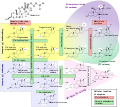Progesterone (medication)
Progesterone (medication)
Progesterone is a medication and naturally occurring steroid hormone. It is used in hormone replacement therapy, menstrual disorders, infertility, and a number of other conditions. It is taken by mouth, by injection into a muscle, or via a vaginal or rectal suppository.
Medical uses[edit]
Progesterone is used for a variety of indications, many of which are in the field of reproductive medicine. These include:
- Hormone replacement therapy: Progesterone is used in combination with an estrogen as a component of menopausal hormone therapy for the treatment of menopausal symptoms.
- Menstrual disorders: Progesterone is used to treat menstrual disorders such as amenorrhea and dysmenorrhea.
- Infertility: Progesterone is used in the treatment of infertility, particularly in women with luteal phase defect.
Side effects[edit]
Like all medications, progesterone can cause side effects. These may include nausea, bloating, breast tenderness, headache, mood changes, and dizziness. More serious side effects can include blood clots, stroke, heart attack, and breast cancer.
Pharmacology[edit]
Progesterone is a progestogen and is the major naturally occurring human progestogen. It has a number of effects in the body, including effects on the uterus, breasts, vagina, brain, and bones.
History[edit]
Progesterone was first isolated in 1934 and was first used medically in 1936. It was the first progestogen to be discovered and is the parent compound of all progestogens that have been introduced for medical use.
See also[edit]
Ad. Transform your life with W8MD's Budget GLP-1 injections from $75


W8MD offers a medical weight loss program to lose weight in Philadelphia. Our physician-supervised medical weight loss provides:
- Weight loss injections in NYC (generic and brand names):
- Zepbound / Mounjaro, Wegovy / Ozempic, Saxenda
- Most insurances accepted or discounted self-pay rates. We will obtain insurance prior authorizations if needed.
- Generic GLP1 weight loss injections from $75 for the starting dose.
- Also offer prescription weight loss medications including Phentermine, Qsymia, Diethylpropion, Contrave etc.
NYC weight loss doctor appointmentsNYC weight loss doctor appointments
Start your NYC weight loss journey today at our NYC medical weight loss and Philadelphia medical weight loss clinics.
- Call 718-946-5500 to lose weight in NYC or for medical weight loss in Philadelphia 215-676-2334.
- Tags:NYC medical weight loss, Philadelphia lose weight Zepbound NYC, Budget GLP1 weight loss injections, Wegovy Philadelphia, Wegovy NYC, Philadelphia medical weight loss, Brookly weight loss and Wegovy NYC
|
WikiMD's Wellness Encyclopedia |
| Let Food Be Thy Medicine Medicine Thy Food - Hippocrates |
Medical Disclaimer: WikiMD is not a substitute for professional medical advice. The information on WikiMD is provided as an information resource only, may be incorrect, outdated or misleading, and is not to be used or relied on for any diagnostic or treatment purposes. Please consult your health care provider before making any healthcare decisions or for guidance about a specific medical condition. WikiMD expressly disclaims responsibility, and shall have no liability, for any damages, loss, injury, or liability whatsoever suffered as a result of your reliance on the information contained in this site. By visiting this site you agree to the foregoing terms and conditions, which may from time to time be changed or supplemented by WikiMD. If you do not agree to the foregoing terms and conditions, you should not enter or use this site. See full disclaimer.
Credits:Most images are courtesy of Wikimedia commons, and templates, categories Wikipedia, licensed under CC BY SA or similar.
Translate this page: - East Asian
中文,
日本,
한국어,
South Asian
हिन्दी,
தமிழ்,
తెలుగు,
Urdu,
ಕನ್ನಡ,
Southeast Asian
Indonesian,
Vietnamese,
Thai,
မြန်မာဘာသာ,
বাংলা
European
español,
Deutsch,
français,
Greek,
português do Brasil,
polski,
română,
русский,
Nederlands,
norsk,
svenska,
suomi,
Italian
Middle Eastern & African
عربى,
Turkish,
Persian,
Hebrew,
Afrikaans,
isiZulu,
Kiswahili,
Other
Bulgarian,
Hungarian,
Czech,
Swedish,
മലയാളം,
मराठी,
ਪੰਜਾਬੀ,
ગુજરાતી,
Portuguese,
Ukrainian






